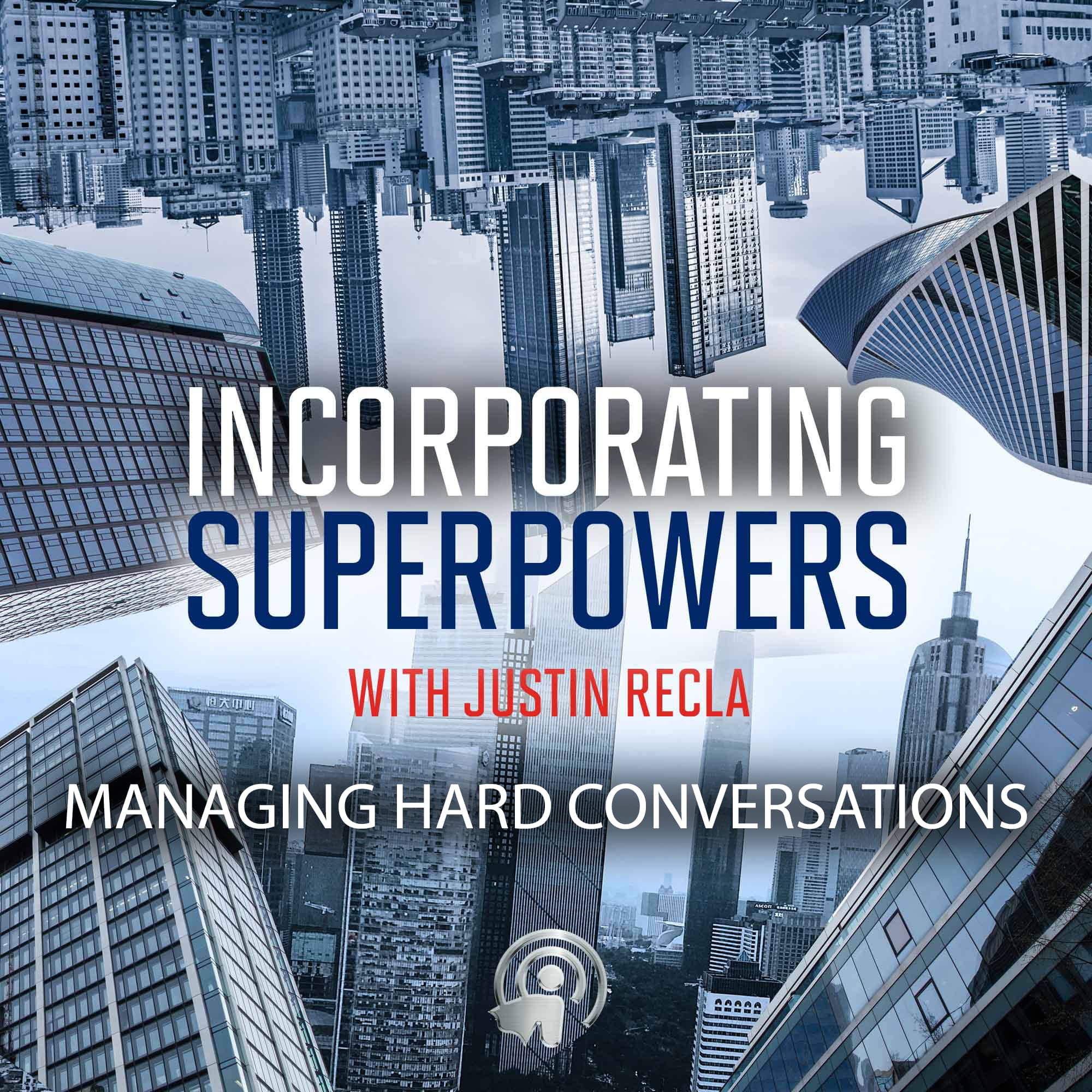
Managing Hard Conversations
Why should managing hard conversions be given attention in the corporate world? In this episode of Incorporating Superpowers, host Justin Recla speaks with guest Jerry Fu. He is a conflict resolution coach and works with those who have trouble managing conflict. Their conversation revolves around Jerry’s process of helping people manage complex discussions. The end goal of this system is to learn how to navigate life and work relationships from the newfound freedoms found when speaking their truth. Tune in and let this episode shed light on how the importance of learning how to manage hard conversations!
Justin Recla:
Welcome back to Incorporating Superpowers. Have you ever had somebody that was difficult to talk to, or maybe a boss that is just kind of over the top, and you don’t know how to go about having those hard conversations? You don’t know how to manage those hard conversations. Well, my guest today is Jerry Fu, and he is helping leaders adapt. He’s literally out there, working with people on how to manage those hard conversations. Jerry, welcome to the show today.
Jerry Fu:
Hey, Justin. Thanks for having me.
Justin Recla:
So, I know a lot of people have fear of conflict. They are scared to have conversations with difficult people, or they’re afraid to rock the boat, or they’re afraid to speak their minds. Where does that come from, first and foremost?
Jerry Fu:
I think we all just want to feel like likable people, right? We don’t want to engage in situations that may compromise that identity or show that maybe we’re a little more selfish or lazy or cowardly than we’d like to admit, that we don’t want to admit that we get scared in tough moments. So, one response to that is to fight through it. Some people who aren’t afraid of challenges, they just say, “Hey, I’m just going to charge ahead.” Like Patton said, when in doubt, attack. They’re like, “Okay,” but then other people say, “Well, the other option if I’m not willing to go through it is just to avoid them altogether, and so, as long as I avoid tough situations, no one will know how bad I am or ineffective I am because I don’t give them even an opportunity to show that I’m incompetent.”
Justin Recla:
I like that in you. I see both of those in the work that we do in the world as well, of people wanting to avoid conflict. They either want to be liked, or they don’t want to be seen. How much would you say that actually stepping into a conflicting situation, a hard conversation, how much would you say is actually from that, from like a psychological mindset perspective? How important is it to have those conversations for our own personal growth?
Jerry Fu:
They’re essential. You have a comfort zone that’s nice when you need to recharge. We will make fun of people who binge on Netflix, but honestly, if you’ve had a hard day, as long as you cap that recharging at two hours or so and it doesn’t turn into a six-hour marathon, sure. Why not? Stay in your comfort zone. Recharge a little bit. As you and I probably know but just to make sure everyone else is on board with this, growth will never happen inside your comfort zone. You can’t expect to improve at anything just by staying comfortable.
So, for people who have been through this process and are on the other side and realize, “Hey, you know what? Closure is so much more beneficial and relaxing than comfort because…” and my own conflict aversion, and I am conflict-averse, but the difference now is that I have a system to kind of try and compensate when I want to betray myself. It’s like if I go to the gym, right, and it’s like, everything in me. I tell people. They’re like, “Wow, Jerry, you’re so disciplined.” I’m like, “No, there are plenty of warnings I’m just like, I don’t want to do this,” but I know that as long as I put my socks on and then I get to the gym, which is only two miles away. It’s like, can I just put my socks on? Can I just drive two miles? Can I just get started on pull-ups?
Now, I’m just finessing my own momentum forward. Next thing you know, I’m halfway through my workout. Even my body will tell me, “You know what? You could just stop like right now. It’s kind of like a partial victory. You could round up, Jerry.” It’s like, Nah, you know what? I came this far. I better finish the workout. You kind of use the sunk cost bias to feel like, well, if I came here, I better finish and then go home.
Then, I go home and I’m like, oh, just so relieved that I got that over with. So, on one hand, I could just design a more fun workout. That’s one incentive, and that’s one approach, but for the days where you have to grind and grit, sure. Just have a system in place, so you don’t give in to your lazy selfish side.
Justin Recla:
I love that. What’s that old saying? When you’re going through hell, the only way through it is to run.
Jerry Fu:
There you go. I love that. Yeah, exactly. I mean, so it’s like if you’re going to be, if the Titanic’s sinking, just throws a party. That’s just like…
Justin Recla:
Yeah. I love the fact that you used the concept of the gym, and the story of the gym because I think that it’s not just willpower. It’s a willingness to know that what lies on the other side of it is everything that you want.
Jerry Fu:
Yeah, exactly. So, to bring the conversation back to conflict, right, when you realize, hey, you know what, I just need to move forward and make sure I lock the gate behind me so I can’t default to my comfort. That’s why the framework I use, one of the steps, the second step is 10 seconds of courage. You say, okay, I can’t be a superhero, but I can be a superhero for 10 seconds. James Clear talks about this concept in the Atomic Habits. Hey, just do what’s the next incremental step forward. So, it’s like, okay, if I have 10 seconds to just pick up the phone, send that text, send that email, and now, I can’t take the bullet back once I shot it from the gun. You’re just kind of like, okay, now, the boulder is setting in motion. It’s like, well, I can’t stop it. So it’s like, okay, well, follow through.
When you realize you give yourself no way out, that’s when you realize, hey, you know what? I have to move forward. I have to grow. I have to learn from this. Eventually, you’re like, hey, you know what? Let me tweak my approach a little bit. You know what? I can still tweak it. Hey, this is pretty good, but what if it could be better? Now, you’re just not even worried about looking incompetent when you realize no one starts off an expert in this stuff, Justin. I used to think that fairly. If you’re a leader, you either got it or you don’t. You’re good at conflict or you’re not. Then, until you realize that most things in life fall into a skillset that you can improve, right? If you’re willing to put in the work, you’re probably going to get better. You may not be the best, but maybe the goal is just to get better.
Justin Recla:
Good stuff. Jerry, where can people go find more information about you because I want to dive down this rabbit hole a little bit further on the backside of the conversation, where can people go find more information about you?
Jerry Fu:
Oh, of course. Yeah. The main place is the website, which is www.adaptingleaders.com. You can get a free guide that you can download with my framework for how to handle difficult conversations. You can schedule a complimentary 30-minute call, or you can just check out the blog where I summarize useful, interesting leadership literature and offer other live acts.
Justin Recla:
I love it. Folks, go take a look at Jerry’s website. Look at the work that he’s doing in the world. When we get back from the break, we’re going to dive down this rabbit hole a little bit further and expand on what and how to manage conflict in your life. Stay tuned. We’ll be right back.
For the best listening experience, download the Superpower Network App
Podcast: Play in new window


